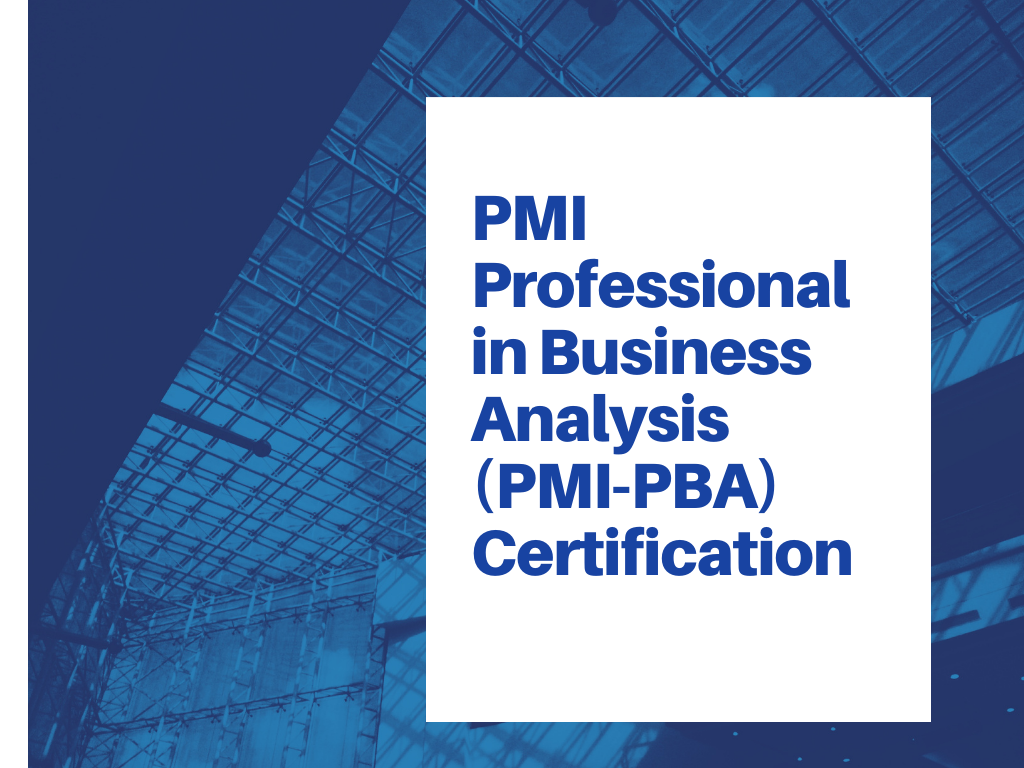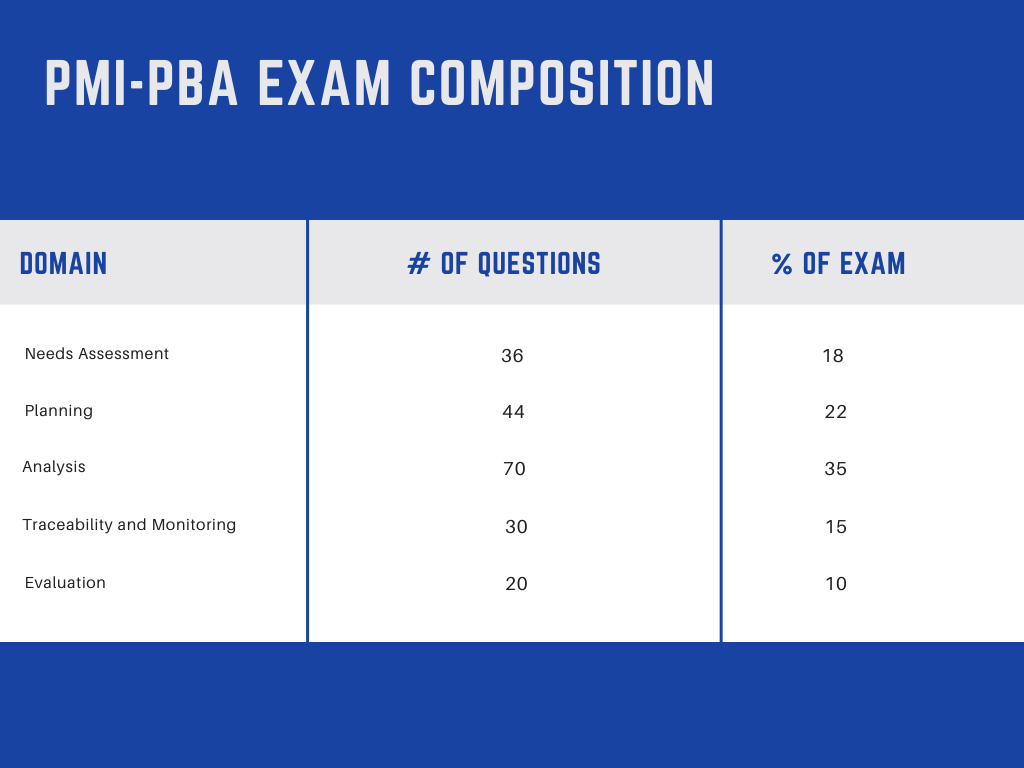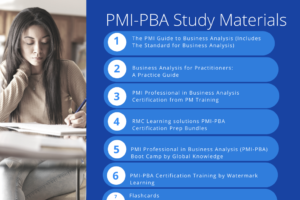What is the PMI-PBA Certification

Exam syllabus
The PMI Professional in Business Analysis (PMI-PBA) exam is administered by the Project Management Institute (PMI). The exam is based on the PMI-PBA Examination Content Outline, which describes tasks/activities from five domains:
- Needs Assessment (18%)
- Planning (22%)
- Analysis (35%)
- Traceability and Monitoring (15%)
- Evaluation (10%)

The exam consists of 200 multiple choice questions based on the Business Analysis for Practitioners: A Practice Guide, and the PMI Code of Ethics.
The exam is a closed-book one with no reference materials allowed. The only reference materials allowed are your brain-dumps (allowed on the materials you are given for rough sketches when the proctor checks you in). The Online Proctored Test (OPT) allows virtual whiteboard while Center-based Testing (CBT) allows physical sheets and pencils for note taking.
Twenty-five of the 200 questions on the exam are seeded “sample” questions. These questions are used to test their level of difficulty and quality to determine if they should be added to the PMI’s questions database. The seeded questions do not count against you as a test taker. These questions are placed randomly throughout the exam. The test taker is only graded on their proficiency in the remaining 175 questions.
Item references
An exam question with its possible answer choices has at least two references to standard books or other sources of Business Analysis. Most of the questions reference Business Analysis for Practitioners: A practice Guide.
For each of the domains, there are associated numbers of tasks as indicated in the PMI-PBA Examination Content Outline.
- Agile Principles and Mindset (5 tasks)
- Value Driven Delivery (6 tasks)
- Stakeholder Engagement (8 tasks)
- Team Performance (5 tasks)
- Adaptive Planning (4 tasks)
Business Analysis has become important because requirements have to be properly gathered and managed for projects to achieve success.
Purpose
Effective and accurate requirements gathering has been identified as one of the top reasons projects succeed or fail. All organizations including non-profits, government, and other organizations rely on Professional Business Analysts for proper requirement gathering and management to significantly increase the chances of project success. They are able to achieve this by applying their knowledge of the standardized and evolving set of practices present in the Business Analysis for Practitioners..
The Professional in Business Analysis certification is among the topmost in-demand certifications for Business Analysts according to CIO. Business Analysts earn an average salary of $68,346 per year according to Glassdoor survey with a low of about 65,000 and a high of 120,000 per year. Getting certified as a Business Analyst increases professionals’ odds of earning a higher salary than their non-credentialed counterparts.
Examination process
Pearson VUE testing centers provide the PMI-PBA exam as a computer-based test either at a test center or remotely. They are administered with the supervision of proctors.
The exam consists of 200 questions. 25 are seeded questions, which are not included in exam grading. The overall score is based on the other 175 questions. Each multiple-choice question has one correct answer and three incorrect answers. There is no penalty for an incorrect answer.
As noted earlier, the examination can now be taken from home or an office location as extra options to sitting for the exams at the testing center.
There will be a live proctor and the requirements include a quiet environment, a reliable internet connection and a computer with a webcam.
Candidates who take the computer-based test receive their results (passed or not passed) on the screen immediately upon completion using PMI’s 4 proficiency levels (Above Target, Target, Below Target, and Needs Improvement) in each of the 5 domains.
Examinations are administered via Online Proctored Test (OPT) or Center-based Testing (CBT). The proctors provide the exam results to the candidate on a score report after the examination.
PMI Audit
Random Audits are PMI’s modus operandi to verify the experience and/or education claims by certification candidates. This is done to maintain the integrity and standing of PMI as a body and the PMI-PBA certification and all other associated certifications.
Item writing
Item writing is used to add new questions to the PMI-PBA Examination database while other questions are taken off using project management guides and texts as guides. Instructors, course developers, book authors, and other individuals who are active in the field of PMI-PBA exam education are not allowed to conduct item writing.
Eligibility Requirements
Candidates must meet the prerequisites in one of the following groups to be eligible for PMI-PBA Certification:
Group A
- Secondary degree (high school diploma, associate degree or the global equivalent)
- 60 months of experience as a Business Analyst
- 35 contact hours of business analysis education
Group B
- Four-year degree
- 36 months of experience as a Business Analyst
- 35 contact hours of business analysis education
Continuous Credential Requirements (CCRs) require Professional Development Units (PDUs)
PMI Professional in Business Analysis (PMI-PBA) holders require a total of 60 Professional Development Units (PDUs) every 3-year Cycle to maintain their certifications.
The PDUs must satisfy the components of the PMI Talent Triangle (technical, leadership, and strategic and business management expertise). PDUs are earned from:
- Education
- Giving back to the profession
The minimum number of PDUs that can be earned from education is 35 and the maximum that can be earned from giving back to the profession is 25.
The following activities qualify as PDUs
- Creating educational content
- Speaking at project management events
- Volunteering
- Practicing as a project manager
- Attending project management training or courses
- Research in the field of project management
The PDUs must satisfy the components of the PMI Talent Triangle (technical, leadership, and strategic and business management expertise).
Other PMI credentials
PMP (Project Management Professional) is one of nine credentials offered by PMI:
- PMI Project Management Ready
- Certified Associate in Project Management (CAPM)
- Project Management Professional (PMP)
- Program Management Professional (PgMP)
- PMI Agile Certified Practitioner (PMI-ACP)
- Disciplined Agile
- PMI Risk Management Professional (PMI-RMP)
- PMI Scheduling Professional (PMI-SP)
- Portfolio Management Professional (PfMP)
- PMI Professional in Business Analysis (PMI-PBA)

